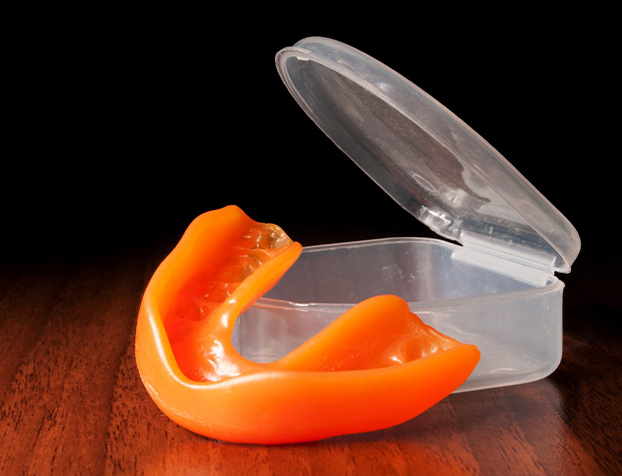Mouth Guards

Protect Your Teeth with Mouth Guards
Mouth guards are not just for athletes. These dental devices can help with a variety of health issues in both children and adults, such as teeth grinding and sleep apnea. Made of plastic, a mouth guard is worn over the upper teeth to protect them, as well as the tongue, gums, and cheeks, from injury.
There are different types of mouth guards available, including custom-fitted ones that are comfortable and effective. Cedar Grove Dental Group in Cedar Grove, NJ and the surrounding area offers dental mouth guards. To schedule an appointment or learn more about our services, please call us at (973) 857-0567.
Choosing the Perfect Candidate for a Mouth Guard
Dental mouth guards are recommended by the American Dental Association for both children and adults to protect teeth from various risks. Custom-fitted mouth protectors are advised during activities that may pose a risk of mouth injury. In addition to sports, many people also suffer from teeth clenching and grinding, which can lead to excessive wear and tear on the teeth, jaw pain, and severe headaches. A mouth guard can help prevent grinding and alleviate muscle tension by covering the top teeth and separating them from the bottom teeth.
Individuals with braces or other fixed dental appliances can also benefit from using mouth guards. While typically covering just the upper teeth, patients with braces can also receive mouth guards for the lower teeth. This is especially important for those with braces who participate in sports, as a hit to the face can cause significant injury to the mouth's soft tissues due to the metal brackets and wires.
“Dentists can work with their dental lab and the patient to create custom-fitting dental crowns that may restore a tooth’s shape and size to near perfect.”
Customizing a Mouth Guard
The perfect mouth guard should be custom-fitted to the patient's mouth, comfortable and secure, and easy to clean. Custom-fitted mouth guards are more durable and tailored to meet the patient's specific needs. With proper care, they can last for years.
Typically, the process of creating a dental mouth guard involves two appointments. During the first appointment, we will take an impression of the patient's teeth and create a model for a personalized mouth guard. At the second appointment, we will ensure that the mouth guard fits correctly, filing down any rough edges and making necessary adjustments for comfort.
“Custom-fitted mouth protectors are more durable and personalized to address the patient’s specific needs.”
When is it necessary to wear a mouth guard?
It is important for patients with night mouth guards to wear them every night to experience the health benefits. While it may take a few days to get used to sleeping with the mouth guard in place, as long as it is comfortable and fits well, the adjustment period should not be long. Consistent use is key to reaping the benefits, as sporadic use will only make the adjustment period harder and hinder progress in correcting any health problems.
For patients with dental mouth guards for physical activity, it is crucial to wear them every time they engage in activities that could potentially cause injury to their mouth or teeth. Athletes should avoid taking out their mouth guards and chewing on them, as this can cause them to break down or deform. Following all care instructions is essential to ensure the mouth guards last and provide the necessary protection.
“Patients must dedicate themselves to wearing their mouth guard consistently to experience its health benefits.”
A Solution for Sleep Apnea and Snoring
If you snore or have mild to moderate sleep apnea, a dental mouth guard may be beneficial. Sleep apnea is a condition where a person temporarily stops breathing while asleep, increasing the risk of heart disease and stroke, as well as causing excessive snoring.
A mouth guard for sleep apnea does not cover the teeth, but instead pushes the lower jaw and tongue forward to keep the airway open. This dental device can improve sleep quality and decrease the frequency and volume of snoring. Mouth guards specifically designed to reduce snoring typically function similarly to those for sleep apnea.




